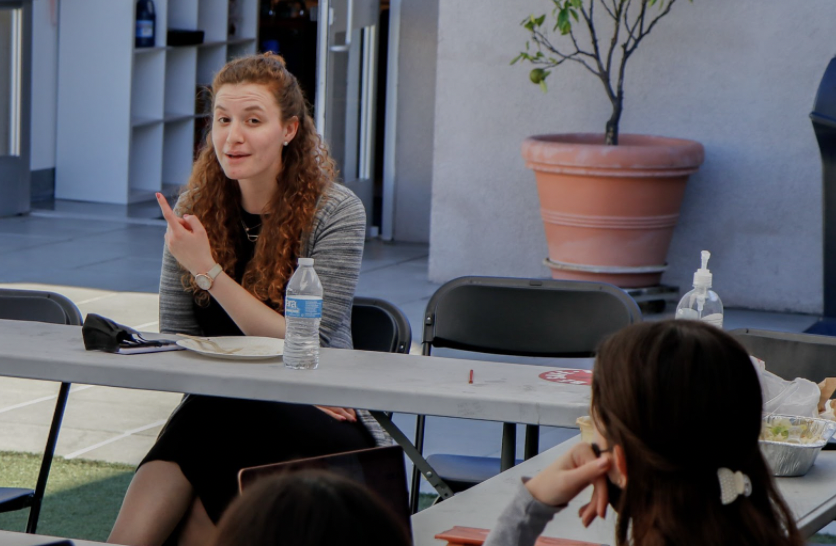School hopes new GPATS fellow will set an example of women’s learning
Thanks to Zoom, YU graduate student is teaching at Shalhevet both virtually and in person.
FIRST: Ms. Etshalom, who co-teaches the 12th-grade Beit Midrash class this year, had lunch with students in January on the turf.
April 7, 2022
It is the first full in-person school year since March of 2020, and the seniors at Shalhevet are learning through Zoom from a grad school student living in New York.
Their teacher is Ms. Ariella Etshalom, a student in Yeshiva University’s Graduate Program in Advanced Talmudic Studies, or GPATS, who is co-teaching the senior Beit Midrash track from New York.with her father, Judaic Studies teacher Rabbi Yitzhak Etshalom.
GPATS students begin learning at 9 a.m. and end at 5:30 p.m., mostly in pairs, or chevruta. Housed in Stern College, it is like a kollel for women with about 26 women in the program this year. They study Gemara, Tanach and halacha Monday through Thursday, and also are given opportunities to teach Torah in schools in the New York area.
“Having all that time with a chevruta, every morning, and every afternoon, while you’re learning, you have to be able to learn it well enough to explain it,” said Ms. Etshalom in an interview. “When they don’t understand something, or when you don’t understand something, you have to be able to explain it again, and again, and again. And so that really, really prepares you for teaching.”
Although she is studying in New York, Ms. Etshalom grew up in Los Angeles. Working with her father was an unexpected bonus.
“I thought I was gonna be teaching some classes or doing some things within the broader Shalhevet community,” Ms. Etshalom said. “I didn’t even realize that I would get to work with my father, so that was a really exciting part.”
According to Head of School Rabbi David Block, Shalhevet has been trying to do more things with Yeshiva University, where many of Shalhevet’s rabbis – including Rabbi Block – studied and received their rabbinic ordination. Every year, a handful of Shalhevet graduates choose YU or its women’s division, Stern College. Both are located in New York City.
Ms. Etshalom is being called a “GPATS Fellow,” and Rabbi Block said he is hoping the fellowship will be ongoing.
“We are seeing the fellowship right now as a 2-year program,” Rabbi Block said in an interview. “It could be that we decide to bring in more than one fellow at once, even though that will be down the line. Right now we want to start slow and see how it works.”
Rabbi Block also said it is important for Ms. Etshalom to teach the Beit Midrash class.
“For a long time, high-level Gemara learning was something that was really only accessible to men,” Rabbi Block said. “I thought Yeshiva University was doing a remarkable job … of saying, ‘Hey, this is really really important.’ … For our young women to note that is a possibility to go and learn Torah at a high level… is a wonderful thing to expose our students to.”
Ms. Etshalom teaches with her father through Zoom on Fridays during period A and period J. Period J is the time for regular davening, but the students in Beit Midrash Track daven before school begins in Hashkama minyan so they can attend.
In previous years, Ms. Etshalom taught for a year at New York’s SAR High School and is also an NCSY advisor. Through these experiences, she has realized that she enjoys teaching at a high school level.
The class that Ms. Etshalom and Rabbi Etshalom co-teach focuses on Talmud learning. Right now, the class is learning the part of the Gemara text Bava Batra that explains joint ownership, and whether somebody could force someone else to make a fence in a shared backyard or courtyard. All of the texts that they study are written in Hebrew and Aramaic.
When she’s in Los Angeles, Ms. Etshalom helps out in other ways around Shalhevet, including substitute teaching. This past January, Ms. Etshalom attended the school-wide Shabbaton and gave a Dvar Torah for the school.
Senior Henry Fried said Ms. Etshalom serves an important role in his Beit Midrash class.
“I have already learned a few tricks from her, such as when to split up phrases and when to start translating and when to stop,” Henry said in an interview.
His fellow senior Emily Klausner said that because Ms. Etshalom is younger, she is easy to connect with.
“The girls have someone to connect to that’s younger, and she feels like both faculty and a friend,” Emily said in an interview.
GPATS officials said when Shalhevet approached them, Ms. Etshalom was a natural choice.
“Rabbi Block – who I happen to know – approached me to ask if I would create this fellowship partnership,” said Ms. Nechama Price, the GPATS director, “and I thought of the perfect person because I knew Ariella Etshalom is extremely talented teacher and she comes from LA.”
“We tried to create this partnership a number of years ago,” she added, “but sadly, we didn’t have any students who had the ability to travel to LA on a constant basis.”
According to Rabbi Block, that makes Ms. Etshalom’s presence one of the good things learned from the time of Covid and Zoom.
“Covid, I think, opened up the world’s eyes to [see that] some things can really work over Zoom,” Rabbi Block said. “There are some positive values and really high-level learning can take place over Zoom.”













